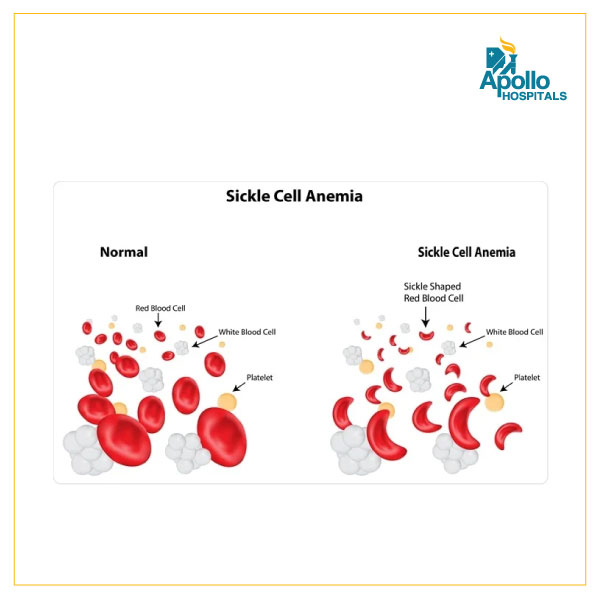Everything you need to know about Sickle Cell Anaemia
- 1333 Views
- Apollo Hospital Mumbai
- June 9, 2023
- Hematology

Verified by: Dr. Punit Jain, Lead & Consultant BMT Program, Consultant Haematologist & Hemato-Oncologist, Apollo Cancer Centres, Navi Mumbai
In the union budget of FY 2023-24, the finance minister announced the launch of a mission to eliminate Sickle Cell Anaemia (SCA) by 2047 – the 100th year of India’s independence. The mission entails focusing on creating awareness and universal screening for those in the zero to forty year’s age group.
What is Sickle Cell Anaemia (SCA)?
Sickle Cell Anaemia (SCA) is an inherited (acquired through parents) red blood cell disorder that affects haemoglobin. Normally, red blood cells are disc-shaped, enabling easy passage through the blood vessels. However, in people with SCA, the red blood cells have a tendency to become crescent- or “sickle”-shaped due to a genetic mutation making them sticky and rigid, thus, restricting blood from reaching different parts of the body. Diagnosis is usually done through a combination of blood tests.
What are the symptoms of SCA?
- Symptoms in babies: Babies born with sickle cell anaemia do not have symptoms for several months due to the persistence of fetal haemoglobin in the initial few months; otherwise, symptoms include extreme tiredness or listlessness from anaemia, swollen hands and feet, and jaundice.
- Symptoms in children and younger adults: Children can present with fatigue and listlessness, painful events due to vaso-occlusion caused by blocked vessels presenting with body and joint pains. Recurrent anaemia (low haemoglobin) requiring transfusion support can lead to breathlessness, weakness, and slower growth and development in children. Over a period of time, recurrent splenic infarction due to vaso-occlusion leads to spleen damage that makes patients more vulnerable to life-threatening infections. Repeated infections, periodic episodes of painful crisis, painful priapism (prolonged and painful penile erections) and damage to vital organs such as the kidneys, spleen, and brain can sometimes lead to significant morbidity and poor quality of life. The added psychosocial and financial burden to the family adds to the overall stress.
How is SCA treated?
Management of sickle cell anaemia is usually aimed at avoiding pain episodes, relieving symptoms, and preventing complications. Treatments include medications like hydroxyurea, and folate, timely vaccinations and blood transfusions when indicated. Blood transfusions are used to increase the number of normal red blood cells, which helps reduce symptoms and prevent complications such as stroke. Novel research has helped identify medications like L-glutamine, Crizanlizumab and Voxelotor, which help to reduce painful crises.
A stem cell transplant (BMT) can cure SCA in children and teenagers. The procedure involves replacing the affected bone marrow with healthy bone marrow obtained from a matched donor, such as a sibling or unrelated donor and sometimes either parent can be a haploidentical donor who may have a sickle cell trait and not a full disease. Although curative, BMT in sickle cell disease has its fair share of risks; hence the treatment is only recommended to people, usually children, who have significant complications of SCA. Clinical trials are also ongoing to address gene correction in SCA.
Apollo Hospitals Group, India, has performed over 2500 bone marrow transplants with good outcomes and remains a trusted name in the field of Bone Marrow Transplant (BMT) for both domestic and international patients. Apollo group of hospitals have a highly qualified multidisciplinary BMT team with stringent infection control norms which is extremely critical for BMT patients. Apollo also offers genetic counselling for early diagnosis and prenatal evaluation of parents with sickle cell trait or a homozygous disease. Several successful pregnancies in women with sickle cell disease have also been conducted successfully at Apollo hospitals.
A combined approach for an early diagnosis with optimum treatment remains the key to managing this disease and ensuring better treatment outcomes for people with SCA!
Call 022 6280 6280 for an appointment.
- November 25, 2024
Multiple Sclerosis (MS): Early Detection and Treatment Matter
- November 25, 2024
Pediatric Kidney Disease: Causes, Symptoms, and Treatment
- November 25, 2024
Obstructive Sleep Apnea (OSA): What You Need to Know?
- November 25, 2024
What is Inflammatory Bowel Disease (IBD) and How Does it Affect You?
- November 25, 2024
How Can You Boost Your Immunity for Better Health?
- Bone Marrow Transplant3
- Cardiac sciences44
- Child Care7
- Clinical Excellence33
- Cosmetology2
- COVID-199
- Diseases4
- Emergency8
- Emergency10
- Endocrinology1
- ENT5
- Fetal Medicine1
- Gastroenterology7
- General Medicine10
- General Surgery3
- Genomic Medicine2
- Gynecology1
- Health14
- Hematology2
- Kidney Transplant5
- Kidney Transplant2
- Liver Transplant6
- Neonatology1
- Nephrology2
- Nephrology & transplant1
- Nephrology & Urology4
- Neurosciences1
- Neurosciences21
- Nutrition/Diet1
- Obstetrics & Gynecology9
- Obstetrics & Gynecology4
- Oncology92
- Oncology3
- Ophthalmology1
- Orthopedic13
- Patient Speak1
- Pediatric Surgery4
- physiotherapy2
- Psychologist2
- Pulmonology2
- Rheumatology1
- Robotic Suregry1
- Robotic Surgery11
- Spine1
- Uncategorized111
- Women Care5
